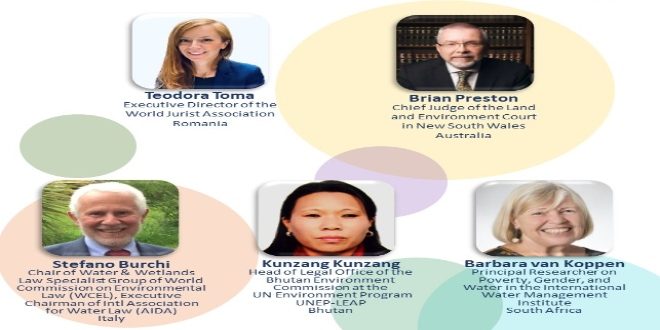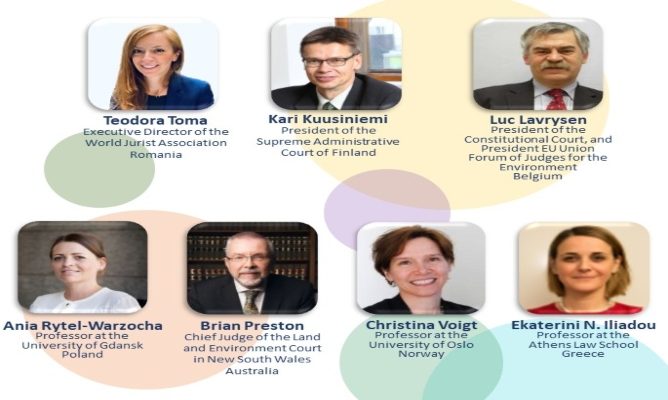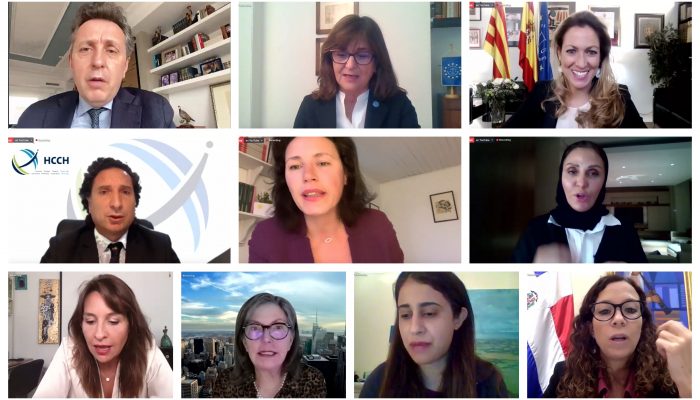The World Jurist Association (WJA) organized on February 9 the Opening Session Sydney about the “Brasilia Declaration of Judges on Water Justice”, featuring academic referents and prestigious professionals from different parts of the world. The online conference analyzed the basic principles of the Brasilia Declaration to promote water justice through the application of water legislation and the rule of law in environmental matters. This debate gave continuity to the Permanent Forum on Energy Transition and Climate that will culminate in the 28th edition of the World Law Congress to be held on July 20-21, 2023, in New York.
Teodora Toma, Executive Director of the WJA, introduced the forum contextualizing the importance of water in our lives and the need to use it wisely. For years, water scarcity has been a problem aggravated by waste, pollution, and unsustainable management.
Brian Preston, Judge of the Land and Environment Court of New South Wales, Australia, started by introducing the ten principles of the Brasilia Declaration. In his view, Principle 1 is the most relevant; it emphasizes that water should be recognized as a good of public interest, given that the State should exercise the management of all water resources and protect them together with their associated ecological functions, for the benefit of present and future generations. This principle also promotes the importance of intergenerational equity, and “governments have a responsibility to manage water resources for present and future generations”.
Judge Preston explained that principle 4 seeks to avoid costly measures to rehabilitate, treat or develop new water supplies or related ecosystems. The prevention of future damage to water resources and related ecosystems should take precedence over the repair of damage, considering the best available technologies and best environmental practices. As per principle 5, he detailed that “despite scientific uncertainty or complexity about the existence of serious or irreversible damage to water, human health or the environment, or risks of such damage, a judge should take the necessary protective measures, taking into account the best available scientific evidence”. Finally, he emphasized principle 8, water justice and good water governance, explaining that the existence of good water legislation and its enforcement are essential for the protection, conservation and sustainable use of water resources and related ecosystems.
Stephano Burchi, President of the International Association for Water Law (AIDA), explained how the Brasilia Declaration made members of the Judiciary aware of the scope of this problem. “The Declaration is a legally binding instrument; however, it has already been introduced, inspired and incorporated into the jurisprudence of different jurisdictions around the world”. He then stressed that the concept of water justice has several complementary angles: legal, institutional, social, and ecological equity.
Afterwards, Kunzang Kunzang, Legal Director of the National Environment Commission of Bhutan, clarified the relevance of Principle 2 of the Declaration, which involves land use and ecological function of property, she detailed that every person entitled to use water resources or land has a duty to maintain the ecological functions and integrity of water resources and ecosystems. Principle 7, on the other hand, states that the polluter pays, the user pays, and that environmental costs and externalities should be international. It states that “environmental factors should be included in the assessment and pricing of water resources and their services. In this way, for example, those who cause water pollution and ecosystem degradation should bear the costs of pollution”.
Barbara van Kopper, Emeritus Scientist on Poverty, Gender and Water at the International Water Management Institute, explained principle 3, which deals concerns the rights of indigenous and tribal peoples to water resources and related ecosystems, which should be respected along with their traditional relations and customs with these resources and ecosystems.
Follow us on twitter:




